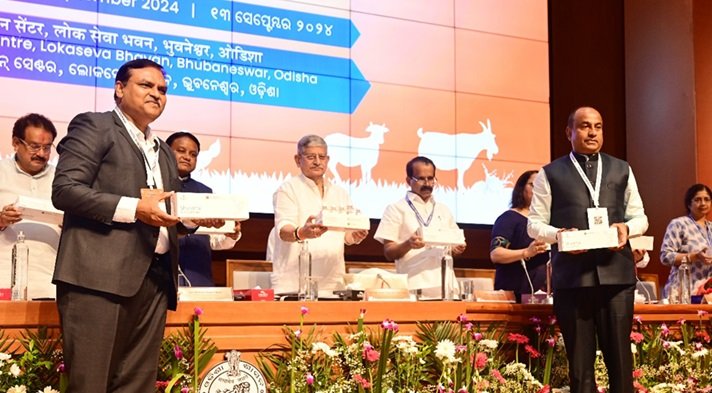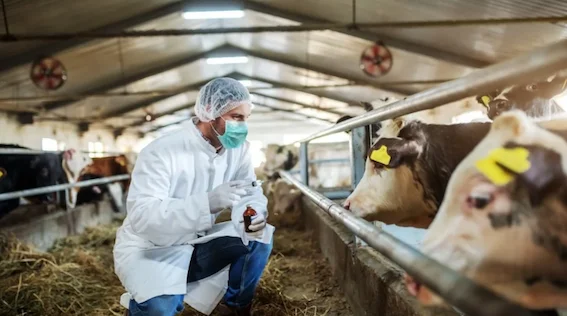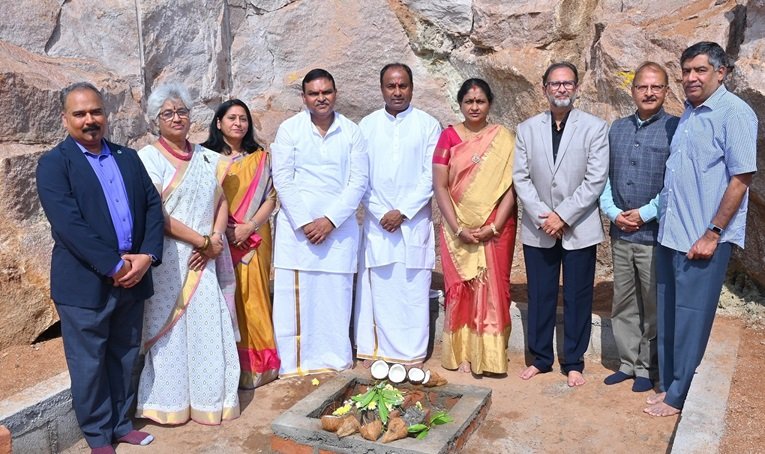India, home to the world’s largest livestock population of 535 million according to the 20th Livestock Census 2020, faces a significant challenge: the growing burden of animal diseases. This situation has prompted an urgent response from both global pharmaceutical and biotech organisations, which are tirelessly researching and developing innovative methods to cure and contain these diseases. Pharmaceutical companies are focused on creating new drugs to treat suffering animals, while biotech firms are spearheading the development and manufacturing of vaccines to prevent diseases before they strike. Let’s examine the key players involved in putting India on the global map for livestock health solutions.
In India, leading companies such as Indian Immunologicals Limited (IIL), Hester Biosciences, and Biovet are at the forefront of this crucial work. They are collaborating with premier research and academic institutions not only in India but also in countries like the USA, UK, and Australia to develop new vaccine entities to combat complex diseases.
Besides there are other animal vaccine companies such as Zoetis, Inc., Elanco India Private Limited, Merck Limited, Ceva Animal Health India Pvt Ltd, Biomed Healthcare, Globion India Private Limited, Biovet Pvt Limited, Brilliant Bio Pharma Pvt Ltd, Indovax Private Limited etc. which are providing the best solutions to the Indian livestock industry.
These efforts extend to partnerships with global companies to develop vaccines tailored for various domesticated animals, including pets, cattle, pigs, goats, and sheep. This collaborative approach ensures that India remains a pivotal player in the global fight against animal diseases, continuously working to improve animal health and safeguard livestock, which is essential for the country’s economy and food security.
According to Dr K Anand Kumar, Managing Director of Indian Immunologicals Ltd (IIL), the demand for animal vaccines in the country is huge and IIL is standing in the forefront to meet this demand. In fact, IIL stands as the market leader in veterinary and human biologicals in India, producing over 150 vaccine products and hugely catering to the National Animal and Human Health Immunisation programme.
“At present our goal is to enhance the quality of livestock in the country, but at the same time we also want to utilise our technological capabilities for the benefit of the people. Keeping this in mind, IIL operates one of the largest veterinary vaccine manufacturing plants globally and possesses robust infrastructure and cold chain distribution capabilities, allowing us to effectively reach both domestic and international markets,” says Anand Kumar.
A few highlights of some of vaccine manufacturing companies that are majorly catering to the animal healthcare needs are as follows:
Indian Immunologicals Limited
Currently, IIL is a significant player in the animal health market by offering a variety of therapeutic products for livestock and companion animals to enhance their productive and reproductive status along with prophylaxis against certain diseases. The product portfolio comprises vaccines, formulations and nutraceuticals. Additionally, it also markets generics and over-the-counter (OTC) products that are available at veterinary retail stores across India.
In 2022, IIL announced expansion of operations in New Zealand through its subsidiary Pristine Biologicals NZ. During the same year it announced that it will invest about Rs 700 crore to set up a new animal vaccine manufacturing facility in Genome Valley, Hyderabad to meet the vaccine security of the nation against economically important diseases such as Foot and Mouth disease (FMD) and other emerging diseases. The facility will create total employment for around 750 people.
At present IIL is exporting 150 different types of vaccine for both animal and human to more than 50 countries across the globe. It is also notable here to highlight that IIL is the first Indian company which has developed rabies vaccine through tissue culture, and is credited for developing the world’s first vaccine for porcine cysticercosis, a tape worm like parasite usually found in pigs.
Some of the important animal vaccines that are in pipeline for development at IIL include Marker Vaccine for infectious Bovine Rhinotracheitis and Multicomponent Clostridial Vaccine.
Not just IIL, there are also a host of pharmaceutical and vaccine manufacturing firms like Biovet, Hester and others which are equally catching up to cater to the demands of the animal vaccine segment in India.
Biovet
For instance, Biovet, which is a subsidiary of Bharat Biotech, has invested Rs 200 crore for establishing First Biosafety Level-3 PlusAg Vaccine manufacturing facility at Malur in Karnataka. The company is expanding and upgrading its existing infrastructure to manufacture Foot and Mouth Disease (FMD) in animals. The company has successfully manufactured BioFMD-Oil Vaccine to cure and prevent various clinical signs like fever, profuse salivation, Nasal discharge, Vesicle on tongue, lip, and dental pad in cattle, sheep, goat and pigs.
In addition to FMD vaccine, the company is also manufacturing other vaccines like Bluetongue Disease Vaccine, Haemorrhagic Septicaemia Disease Vaccine, Johne’s disease Vaccine and Black Quarter Disease Vaccine etc, which are all catering to prevent and cure various diseases in Animals.
Highlighting about the company’s facilities, Narayan Singh, Managing Director of Biovet Pvt Ltd observed that the company is a leader in FMD vaccine production and it has established a world class facility at the Malur in Karnataka. “We have invested Rs 150 crore for setting up a world class facility for manufacturing FMD vaccine. At Biovet our R&D division is engaged in the development of products and processes, and in transferring the technologies to the production section. The focus is on inventing and developing vaccines for new infectious, emerging and reemerging diseases of animals at economical and affordable prices,” says Singh.
From a one-product company, Biovet is now growing to a multi-product company because of its in-house R&D and process development. Biovet in collaboration with national and international organisations is bringing in the latest concepts and methods in product development.
For ensuring biosafety, the company has set up India’s 1st and World’s 2nd BSL-3 + Ag Production Animal Facility, this Global Standard Facility was set up with an investment of Rs 150 crore. It is also a BSL-3 + Ag Large Animal Testing Facility located at Bengaluru, in Karnataka.
Hester Biosciences
Another major animal vaccine manufacturer in India, Hester Biosciences provides preventive medicines to various categories of animals. The company was founded by Rajiv Gandhi, CEO and Managing Director in 1997. The company which had started by releasing a single vaccine then has today grown into Asia’s largest vaccine producers, exporting various animal vaccine products to different countries globally.
The company’s product portfolio includes Inactivated Vaccines, Live Vaccines, and animal and poultry healthcare products. Hester has recorded considerable growth by contributing to the National Animal Immunisation programme in India. Recently, all states in India have initiated an immunisation programme targeting Lumpy Skin Disease through the Goat Pox Vaccine; this has helped the country gain good profits. However, the company had faced some hurdles in the exports of animal vaccines to international markets due to a decline in demand.
Apart from catering to vaccines for cattle, sheep, goat and pet animals, Hester Biosciences is also contributing heavily for the poultry sector. Apart from catering the animal vaccine needs of India, Hester has also established its unit in Africa and began production in 2021 and meeting the unmet demand of the African animal sector.
“In addition to catering to the domestic demand in India, we are also exporting our animal vaccines to various countries where there is a huge demand. Particularly, Africa, as a continent, is still an untapped market for immunisation of animals against diseases. Africa has a huge gap in demand and supply as there are only a few animal vaccine manufacturers in the entire continent. Tanzania has the third-largest herd of domestic livestock in the world. We not only see this as a wonderful opportunity for growth, but also as a way to promote better health for human beings through healthier animals,” said Rajiv Gandhi, CEO and Managing Director, Hester Biosciences.
Today, Hester Biosciences has emerged as one of India’s leading animal healthcare companies and is the second largest poultry vaccine manufacturer in the country.
Growing Burden of Livestock Diseases
The India animal health market size reached Rs 80 billion in 2023. Looking forward, IMARC Group expects the market to reach Rs 160.5 billion by 2032, exhibiting a CAGR of 7.8 per cent during 2024-2032. The growing occurrences of zoonotic diseases, the increasing investment by the government authorities to enhance animal healthcare, and extensive research and development (R&D) activities conducted by key players are some of the major factors propelling the market.
Diverse segments contribute to India’s animal healthcare market, with livestock comprising 51 per cent, poultry 35 per cent, companion animals 8 per cent, aquaculture 5 per cent, and other animals 1 per cent. Key vaccines, such as those targeting Peste des petits ruminants (PPR), Brucellosis, and FMD, are in high demand, reflecting the nation’s commitment to combating prevalent animal diseases and ensuring food security.
The sector’s expansion is fueled by increasing demand for animal-derived products, including eggs, dairy, and meat, alongside a growing affinity for companion animals. As the prevalence of animal diseases rises, so does the imperative for robust vaccination programmes, positioning India for sustained growth in this domain.
A proactive governmental stance, epitomised by initiatives like the ‘National Animal Disease Control Programme,’ further amplifies opportunities for growth in the animal healthcare sector. Through strategic investments and collaborative efforts, India is poised to not only meet domestic demand but also emerge as a prominent player in the global arena of animal vaccination, shaping the future of veterinary healthcare on a worldwide scale.
Indian Animal Vaccine Industry Growth
The Animal Vaccine Industry in India is experiencing significant growth, driven by various factors such as the rising prevalence of zoonotic diseases, growth in the livestock population, increasing demand for animal products, a burgeoning pet healthcare market, and growing investment in research and development (R&D) for drug and vaccine development. Under government initiatives like “One Health,” there is a concerted effort to tackle health threats through an intersect oral approach, emphasising the interconnectedness of animals, the environment, and human health. Regulatory bodies like the Veterinary Cell of the Central Drugs Standard Control Organisation (CDSCO) and research institutions like the Indian Institute of Veterinary Institute (IVRI) play crucial roles in overseeing and advancing the animal health sector.
The Veterinary Cell of CDSCO is responsible for regulating animal health products in India, ensuring their safety, efficacy, and quality. Technical reviews for product registration of farm and companion animals are conducted by the Department of Animal Husbandry and Dairying, while the Department of Fisheries oversees aqua products. The IVRI is instrumental in researching and evaluating biologicals in the veterinary sector.
According to a TechSci Research report, the Indian animal vaccine market stood at $235.52 million in 2023 and is projected to grow at a compound annual growth rate (CAGR) of 5.02 per cent from 2025 to 2029. This robust growth can be attributed to several factors, including the increasing prevalence of animal diseases and heightened awareness about animal health among livestock and pet owners.
The rise in various animal diseases is a significant driver for the animal vaccine market in India. Increased awareness among livestock and pet owners about the importance of animal health, coupled with government initiatives promoting veterinary care, are also contributing to market growth. Furthermore, substantial investments in R&D are propelling advancements in biotechnology, leading to the creation of more effective and safer animal vaccines.
“In a country like India, where livestock is integral to the economy, animal health is crucial,” observed Dr Ravinder Reddy, Vice Chancellor of P V Narasimha Rao Veterinary University in Hyderabad. “Livestock directly impacts the livelihood of millions, particularly in rural areas where agriculture and pastoral activities are the main income sources. Healthy livestock contributes to food security by providing essential products such as milk, meat, and eggs.”
Strong Demand & Continuous Innovations
The animal vaccine industry in India stands at the cusp of growth, yet faces several challenges hindering its full potential. Regulatory complexities, inadequate infrastructure, and limited awareness about preventive healthcare among animal owners are among the hurdles. Storage costs and a shortage of skilled personnel further complicate matters, especially in rural areas with unreliable electricity supply.
However, amidst these challenges lie opportunities for collaboration and advancement. Initiatives like “One Health” and the National Animal Disease Control Programme offer avenues for cooperation. Strengthening regulatory frameworks, enhancing R&D capabilities, and leveraging technological innovations can pave the way for overcoming obstacles and unleashing the industry’s full potential.
Technological advancements, notably in artificial intelligence and big data analytics, have revolutionised vaccine development. These breakthroughs have accelerated the creation of highly effective vaccines, bolstering disease prevention and control efforts.
Despite challenges, the animal vaccine industry in India is set for significant growth. Factors such as rising demand for animal products, increasing pet ownership, and growing awareness about zoonotic diseases are driving this trajectory. With supportive government initiatives and a conducive regulatory environment, India is poised to emerge as a global leader in animal vaccination and pharmaceuticals.
In conclusion, sustained investment in R&D and biotechnology will propel the industry forward, offering innovative solutions for animal health. As key players continue to develop effective vaccines, India’s role in global animal health will strengthen, benefitting both livestock and human populations alike.
By Amguth Raju
hyderabad@mmactiv.com
India, home to the world’s largest livestock







